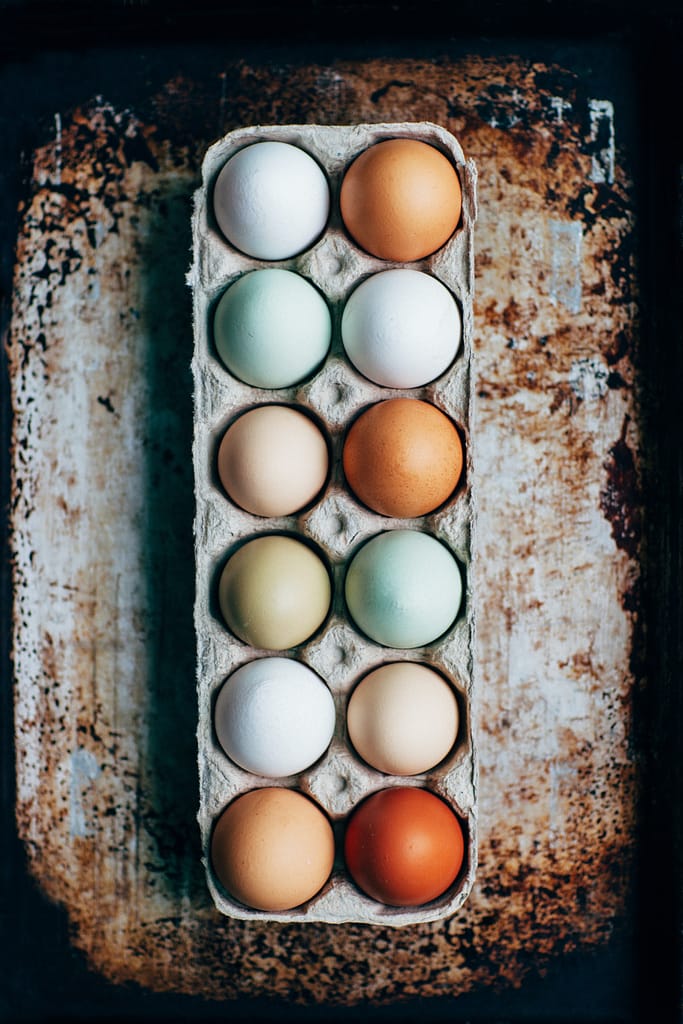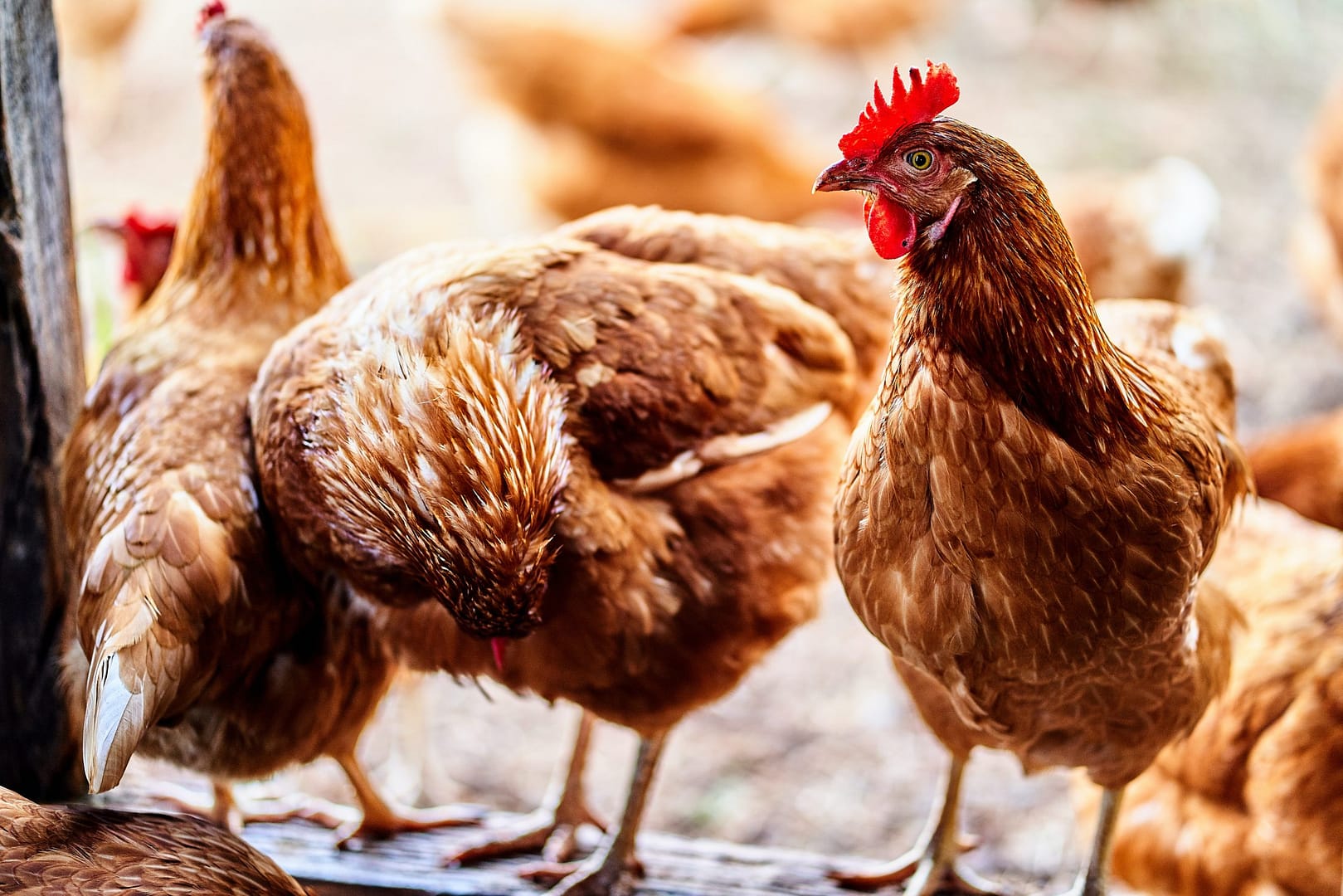Reasons Your Chickens Aren’t Laying Eggs (and Some Solutions)
One of the main reasons people raise chickens is to secure a source of protein in the form of eggs. Not much beats going outside in the morning and collecting your own freshly laid breakfast.
However, the egg-laying abilities of your chickens rely on multiple different factors which affect the quality and quantity of eggs being laid.

Below are 12 reasons why your chickens may not be laying eggs and solutions on how to help the situation.
- 1) Age – Your Chickens are too Young
- 2) Age – Your Chickens are too Old
- 3) The Breed of Chicken
- 4) Diet & Nutrient Deficiencies
- 5) Routine Disruptions
- 6) Illness
- 7) Molting
- 8) Predator Threats
- 9) Lack of Light
- 10) Weather & the Environment
- 11) Broodiness
- 12) Your Chickens are Nomadic Egg-Layers
- Why You Should Care if Your Chickens are Laying Eggs or Not
- Some Questions & Answers on Egg Laying
1) Age – Your Chickens are too Young
The age of a chicken is one of the biggest biological factors affecting their laying ability. Most pullets will begin laying eggs when they’re around 4-5 months old. The first couple eggs they lay might be small or oddly formed, but after they get the hang of it, they will start laying regularly.
Solution: You can’t really make a chicken age faster, but if you’re wanting to get eggs right away you could start out with older pullets or fully grown hens instead of buying your chickens as young chicks (however then you miss out on the cuteness of raising your own little chickies). Purchasing a full-grown, laying-age hen will cost more than purchasing chicks and will typically be around the $15-$30 range. This of course depends on the age, breed, and your location etc.
2) Age – Your Chickens are too Old
As a hen ages, their egg production will naturally start to decrease. Their prime-laying years are usually between 6 months of age to 2-3 years of age. While they will continue to lay at 3+ years of age, there is a noticeable decline in production and a chicken that was giving you 5 eggs a week might only be giving you 1 or 2 (or none at all).
Solution: One of the best solutions for this is to continuously buy or hatch new chicks to add to your flock every couple years or so. If you’re buying/hatching new hens every 2-3 years, then you should have a continuous supply of eggs and not have to worry about running out of eggs (due to your chickens ages at least). Some chicken raisers also have luck with providing extra nutrients in the form of seeds, grain, and other supplements which can help encourage egg laying in older hens.
3) The Breed of Chicken
Some chicken breeds lay more often than other breeds. If you’re wanting chickens that lay a certain size of egg, color, or frequency, then you’ll want to check out the various breeds and their egg-laying characteristics.
Below are some examples of breeds and their average production rated as fair, good, better or best (per Murray McMurray Farm’s Website).

Solution: Purchase chickens from breeds that suit your needs. ISA Browns and Australorps are both prolific egg-layers. However, keep in mind that breeds that lay often, also tend to be more prone to health issues and can potentially have a shorter life expectancy.
4) Diet & Nutrient Deficiencies
Another reason chickens might not lay eggs is due to an insufficient or poor diet. In order for their bodies to produce eggs consistently, they require certain nutrients such as protein and calcium in their diet.
A diet lacking in proper balanced nutrition will lead to decreased egg-laying. This isn’t to say they’ll stop altogether but the amount might decrease, and you may notice some abnormalities in the structure or size of the eggs.
This is why it’s important to provide your chickens with a good-quality layer feed which will contain all of the nutrients your chickens need to stay healthy and perform their daily pecking, ground-scratching, and egg-laying functions.
Layer feed should also be the main part of your chicken’s diet. The reason being, layer feeds are specially formulated with the right ingredients to give your chickens the nutrition they require for daily functions. If you’re providing a lot of treats or other foods, then the nutrition ratio might get diluted, and they won’t get the right amount of nutrients they need – so provide snacks in moderation.
Solution: Provide your chickens with the right kind of feed for their age and needs. Chicks and young chickens should get a starter/grower feed. Egg-laying age hens should get specially formulated layer feeds.
To make sure your chickens have enough calcium, you can provide crushed oyster shell that they can eat from if they need it. Make sure you provide the oyster shell separately from other feeds (don’t mix them together). You can also sanitize, dry, and crush up eggshells and feed back to them for a calcium boost (also give this separately).
If you’re providing layer feed and extra calcium and they’re still not laying often, (and you suspect the problem is diet and not something else) then you could also try upping their protein by providing mealworms or other sources of protein.
Also make sure to provide fresh water at all times. Water is another necessary part of a chickens diet required to produce and lay eggs.
5) Routine Disruptions
A chicken that is stressed out will generally lay less eggs. There are multiple factors that can contribute to a chicken’s stress levels such as being relocated, the introduction of new birds to a flock, lack of space, aggression from other chickens, boredom, loud noises, etc.
Solution: Be aware of and avoid or minimize factors that will introduce stress into your chickens’ lives. If introducing new chickens to a flock, do so in a way that will be safer and more comfortable for all members of the flock.
The below Illness, Molting, and Predator Threats are also causes of stress which can lead to decreased egg laying.
6) Illness
There are, unfortunately, a slew of different illnesses a chicken might get. Bacteria, parasites, colds, respiratory infections etc. can all affect a chicken’s health and its ability to lay.
Solution: Keep your chickens healthy… ensure your chickens are well-provided for with regards to housing and diet. Keeping their housing, feeding, and water areas clean will also go a long way in preventing illness.
Just remember that even if you do everything right and take care of your chickens according to everything you’ve read and been taught, it’s hard to protect them from absolutely everything. What matters is doing the best that you can given your situation and capabilities.

7) Molting
After about year or so, your chickens will undergo their first molt. The molt itself can take anywhere between 1 to 3 months for them to lose and then regain all of their feathers. They’ll look a little funny during the process but once their new feathers grow in they’ll be looking better than ever. Molting’s a great way for chickens to get rid of old broken feathers. However, the process can be a bit stressful on their bodies leading to them laying less or not at all.
Chickens will generally continue to molt once each year. As they age, their egg production tends to decrease slightly after each molt.
Solution: Molting is completely natural and not something to be concerned too much over. However, there are some things you can do to help your chicken stay healthy, minimize the stress caused by molting, and decrease the amount of time it takes to grow back feathers.
If your chickens are molting during colder months, make sure that their coop and run areas are warm enough. Put up clear sheets around their area that will let in sun, but block wind and precipitation.
Ensure there is plenty of bedding in their coop to provide insulation. The deep litter method is especially good for providing insulation in winter. If you live in a particularly cold climate, you may want to consider providing additional heating inside the coop, which is fine, however, stay away from certain light heaters since they pose a fire risk.
Provide your chickens with extra protein. Feathers are made of about 90% protein/keratin. As such, providing your chickens with extra sources of protein you can help up their production of new feathers. Provide them treats such as meal worms, bugs, canned tuna/salmon, or scrambled eggs.
Note – You may notice your chickens eating their own feathers which is also fine and won’t hurt them.
8) Predator Threats
Threats from predators can cause a lot of stress on your flock. If any or your birds have been attacked by a predator and survived, or even if a predator has been nearby, your chickens might become stressed and their production may slow as a result.
Solution: Predator proofing your chickens run and coop are important in preventing predators and other pests from potentially harming them. This can be done with hardwire cloth (1/4” sized holes is safest), predator skirts, sealing up holes, using warning lights, electric fences, netting, guardian livestock animals (dogs) etc.
Different predators have different ways of getting to your chickens so it’s a good idea to look up what types of chicken predators you have in your area and ways to protect your chickens from them.
9) Lack of Light
Chickens typically require light in order to produce eggs. A lack of daylight, especially during winter months, can lead to significantly decreased egg laying. Typically, anywhere between 12 – 16 hours or daylight are ideal for egg-laying birds.
Solution: For winter months, one solution is to provide an artificial light in your chickens coop, set on a timer to help extend the daylight hours. However, chickens often NEED a break from laying eggs (it can be pretty strenuous for ‘em). So it’s really best to not use any artificial lighting and instead let your chickens have a bit of a winter break. They should still lay some, just much less than they do during sunnier months. I typically get about 1/3 of my usual egg amounts out of my younger hens.
Another solution is to time the growth of your chicks so that they’ll reach egg-laying age right before winter. If you purchase your chicks around June or July, they should start laying from around October to December. Fresh egg layers will typically lay prolifically once they get the hang of it and whether they have enough light or not. Keep buying or hatching more chicks around June/July and you’ll continue to have eggs all throughout winter despite your older flock members taking a break.
Another solution some people have mentioned is feeding your chickens spicy peppers during colder months. Chickens can eat spicy things without it harming them, but it supposedly is able to warm their bodies up from the inside which helps encourage egg production – I have yet to try this and have not heard any scientific proof behind it though.
For summer months, make sure that your chicken coop and run areas get plenty of sunshine, especially if they don’t free range much (aka – don’t have them in a completely shaded area). However, do make sure that they have some shady areas to get out of the heat if during summer months.
10) Weather & the Environment
Extreme temperatures and excessive rain/wet can also lead to decreased egg-laying.
Solution: In summer make sure your chickens have enough clean water to drink and some shaded areas to escape the sun. In winter ensure coops have plenty of bedding and insulation and are also draft free.
To prevent your chickens from getting too wet or soggy from rain, build their coops and runs raised up off the ground a bit. Use substrate in the run that is free draining and won’t hold large amounts of water. You can also provide tarps or other covering that will help keep the rain off your chickens.
11) Broodiness
On occasion you might get a broody hen or two. If a hen is broody, then they’re more focused on trying to lay on some eggs and hatch them than they are laying the eggs themselves. If a hen is broody, they’ll also often refrain from eating or drinking as much as usual which also contributes to them laying less.
Broodiness can be a desired trait in some chickens, especially for chicken owners who have a rooster and are wanting to hatch chicks. Having a hen or hens that will go broody saves you from having to buy and incubator and then hatch and raise chicks yourself (which while fun, can be time consuming). A broody hen will do all the work for you if you have one.
Solution: There are a couple solutions to broody hens (which I might talk about more in a post to come), but typically the broodiness can be “broken” by removing your chicken from the nest box and placing in a cage above the ground.
If you have a broody hen though, you can always take the chance to hatch some fertilized eggs if you have a rooster.

12) Your Chickens are Nomadic Egg-Layers
If you let you chickens free range around your property, you might find yourself finding very little eggs being laid in their coop’s nest boxes.
Generally we “train” our chickens to lay their eggs in a nest box in their coop. Nest boxes create safe habitats where your chickens can lay their eggs and also makes it easier for us to collect them.
A free-ranging chicken will sometimes (well… often really), decide to lay their eggs wherever they please whether it be your favorite flower pot, under your car, or randomly around your yard.
Solution: Teach your chickens good laying habits early on. You can do so by providing a fake egg (usually made of wood or ceramic) in the nest box which shows them that’s the place where they’re supposed to deposit their eggs. You can also limit them to their coop and a small run area at first so they’re more inclined to lay in the nest box, and once they have the hand of it expand their area.
You can also fence off and keep your chickens in one area making it easier for you to find eggs if you do have rogue layers.
Otherwise the only solution is to regularly patrol your chickens roaming areas and have a daily egg hunt.

Why You Should Care if Your Chickens are Laying Eggs or Not
As we mentioned above, there are multiple reasons why a chicken may not be laying eggs. While some, such as age, are completely normal, others can be indicators that something is wrong and needs to be addressed.
It’s a good idea to keep track of your daily egg count so you can know if there might be something affecting your chickens laying abilities – whether it be a biological issue such as sickness or something environmental such as lack of light.
Some Questions & Answers on Egg Laying
The below are some questions I’ve seen or heard asked regarding chickens egg-laying habits (or lack of them) as well as the answers to them. 😊
Q: Do chickens stop laying eggs after 2 years?
A: Many people believe that their chickens will stop laying eggs after two years. While egg production does tend to slow after 2 years or so and after your chickens have had their first molt, they will continue to lay well after 2 years of age, typically until they’re about 6 years old, and then they’re egg production will start to slow down significantly – by about 10% each year.
Some speculate this is due to the larger chicken farms “harvesting” their egg-laying stock after two years, which would of course bring the egg laying/stopping average to about 2 years.

